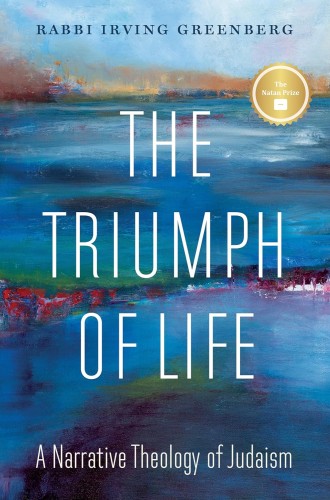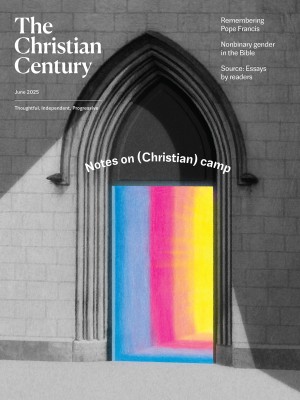The power of covenant and courage
Irving Greenberg aims to reassure Jews and non-Jews alike that the life of the spirit is worth the effort.

The Triumph of Life
A Narrative Theology of Judaism
Irving Greenberg, an acclaimed writer and Orthodox rabbi, has influenced practically every facet of American Jewish life. He is a congregational rabbi, a scholar, an activist, an interfaith leader, president of the J. J. Greenberg Institute for the Advancement of Jewish Life, senior scholar in residence at New York’s Hadar Institute, and more. The Triumph of Life is Greenberg’s own triumphant accomplishment, an encompassing work of theological art that is both scholarly and accessible. The book’s aim is to reassure Jews and non-Jews alike that the covenantal life of the spirit is worth laboring and fighting for. In this postmodern age—an era of both
revolutionary promise and colossal threats to human life,
our painstakingly garnered civilization, and the very survival of all life on planet Earth—Greenberg’s uplifting and instructive guidance will persist as a beacon of learning and enlightenment.
Greenberg openly and lovingly embraces all humans, stating that all people are created in God’s sacred image and represent the Divine in a rich and full rainbow. This vision is reinforced by his courageous call for his readers, particularly those in the traditional Jewish camp, to overcome centuries-old biases that historically have fenced in Judaism and its threatened adherents. These biases arose in an environment of paganism, followed by a nascent Christianity that gradually sought to impose its deviations from the mother religion in a violent manner when facing Jewish resistance and opposition. While the author unequivocally calls for Jews to respect and appreciate Christianity and other religions, he also directly confronts the antisemitism that made the devastation of the Holocaust possible.
Read our latest issue or browse back issues.
In fact, Greenberg attributes the impetus for writing The Triumph of Life to a 1961 experience that shook him. While teaching at Tel Aviv University as a Fulbright lecturer he encountered the enormity of the Holocaust for the first time. That year, the trial of notorious SS officer Adolf Eichmann took place in Jerusalem, and it had a profound impact on a mesmerized nation. I vividly recall living in Israel as a teenager that year and being shocked, as the son of Polish Holocaust survivors, by the horrific events described by shaken witnesses during the Eichmann trial.
Greenberg, raised as an Orthodox Jew, offers a touching confessional of the crisis of faith he experienced that year as his basic assumptions about God, covenant, and life’s meaning were challenged. He writes,
My loving wife and family saved me from nihilism and despair by showing me the incredible tenacity and unspent power of embracing life. The emergent State of Israel suggested to me that the Divine was still operating in the world, and testified to the human capacity to take power for reestablishing life and reasserting its value.
The hoped-for messianic era is within human reach, Greenberg testifies. We have new opportunities for creative unity in the tasks of enriching diversity, upholding universal human dignity, and fostering equality through the restoration of God’s violated image. Greenberg hails the creation of Israel in 1948 as a redemptive divine act that assures God’s covenant with a Jewish people will continue in spite of the Holocaust’s heavy toll.
Having found his way back to faith after a challenging crisis, this Orthodox rabbi reaches beyond the confines of his own faith’s traditions to share responsibility for the world’s repair. The Triumph of Life articulates “the Jewish agenda for world repair,” but Greenberg expresses hope that the book “will appeal to non-Jewish readers as well, especially to Christians, partners in the struggle to overcome millennia of hostility and delegitimation. People of all religions must work together to repair the world politically, economically, and culturally, and turn the Earth into the paradise all humans deserve.”
Greenberg describes a revelation he experienced during a visit to Sri Lanka, where he met committed Christians who had left the comforts of their affluent homes in Norway to attend to the needs of brain-injured children abandoned by their families. He credits the altruistic and steadfast devotion of these remarkable humans to the grounding grandeur of their Christian affiliation:
I was moved by the power of Christian faith to inspire unlimited sacrificial love. Out of such experiences and further exposure to Christian religious life I came to see that, in parts of the Christian community, “surely the Lord is in this place; and I did not know” (Gen. 28:16). Christian ethics were guiding people to work for redemption.
Greenberg’s fervent prayer is for a global, pluralistic embrace of shared covenantal responsibility to protect and enhance life in our anguished world as it yearns for redemption. This prayer is his ultimate response to Nazism’s central message of death—a message that was conveyed by denying the very lives of those who represented and promoted God’s precious blessings of healing, hope, and harmony for all humans.
Greenberg divides the Jewish saga into three major periods: the biblical era, in which God’s active presence was dominant; the rabbinic era, in which God’s involvement diminished; and the present era, in which God is fully hidden to allow for the full human role of active responsibility. The underlying principle is the rabbinic concept of divine contraction (tzimzum), which is born of love and trust in the growing human capacity to wisely and compassionately manage God’s creation toward ultimate messianic human redemption through tikkun olam, the sacred mending of our unique cosmic home, turning accumulated blemishes into enduring blessings so that life may yet triumph.





